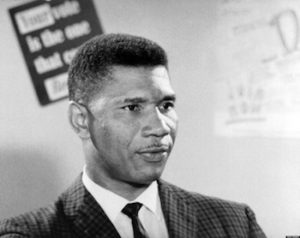
Medgar Evers
Medgar Evers was born on this date in 1925 in Decatur, Mississippi. He was a Black civil rights leader whose assassination in Mississippi galvanized the American Civil Rights Movement.
Raised in a small town in central Mississippi, Evers absorbed his parents' work ethic and solid religious values early in life. Friends, including his brother, Charles, remember him as a serious child with an air of maturity. At 17, he left school to serve in the army during World War II, where, according to writer Adam Nossiter, his experience fighting the supremely racist Nazis made a lasting impression on him.
After the war, Evers obtained his high school diploma and immediately entered Alcorn A&M College, where he played football, ran track, edited the campus newspaper, and sang in the choir. After graduation, Evers worked with Magnolia Mutual Insurance, one of Mississippi's few Black-owned businesses.
Through his employer, Evers became involved with the NAACP, selling memberships while he was selling insurance policies. Despite its moderate, systematic approach, the NAACP was still considered a radical organization by many in Mississippi, where the organization had essentially given up hope. Too likely to become victims of harassment, assault, or murder for any political action, Blacks in Mississippi's Delta region were often afraid to talk about the NAACP. In 1954, when the national organization decided to hire field secretaries in the Deep South, Evers relocated to Jackson, the state capital, and began working full-time for the NAACP. He had two primary roles. To recruit and enroll new members and to investigate and publicize the racist terrorism experienced by Blacks.
It was a dangerous job. Evers was followed, mocked, threatened, and beaten while he traveled throughout Mississippi, the state that had seen more lynching than any other in the country. Organizations like the White Citizens' Councils and the State Sovereignty Committee spied on him. In May 1963, someone threw a bomb into his garage. Evers continued the NAACP's longstanding research on lynching, and he also worked on the legal front, filing petitions and organizing protests against the Jim Crow segregation that still made it impossible for Blacks to go to movie theaters, to eat in restaurants, or to use public libraries, parks, and pools.
Throughout the spring of 1963, Evers led a series of boycotts, meetings, and public appearances designed to bring Mississippi out of its racist past. Just before midnight on June 11, 1963, when Evers arrived home, white American Bryon de la Beckwith shot him in the back. Evers died a few minutes later. All-white juries could not decide Beckwith's fate in two separate trials in 1963 and 1964. Free for more than 30 years after committing murder, Beckwith was finally convicted and jailed for the crime in 1994.
As a representative of the NAACP, Evers worked for the most established and, in some ways, most conservative African American membership organization. By all accounts, he was a hardworking, thoughtful, and somewhat quiet man. Yet the work Evers did was groundbreaking, even radical, in that he risked (and eventually lost) his life, bringing news of his state's violent white supremacy to nationwide attention. When Byron De la Beckwith, a white racist, assassinated Evers in his front yard, he symbolized the brutality with which the Old South resisted the Civil Rights Movement.
African Americans/Voices of Triumph
by Dr. Henry Louis Gates Jr.
Copyright 1993, TimeLife Inc.